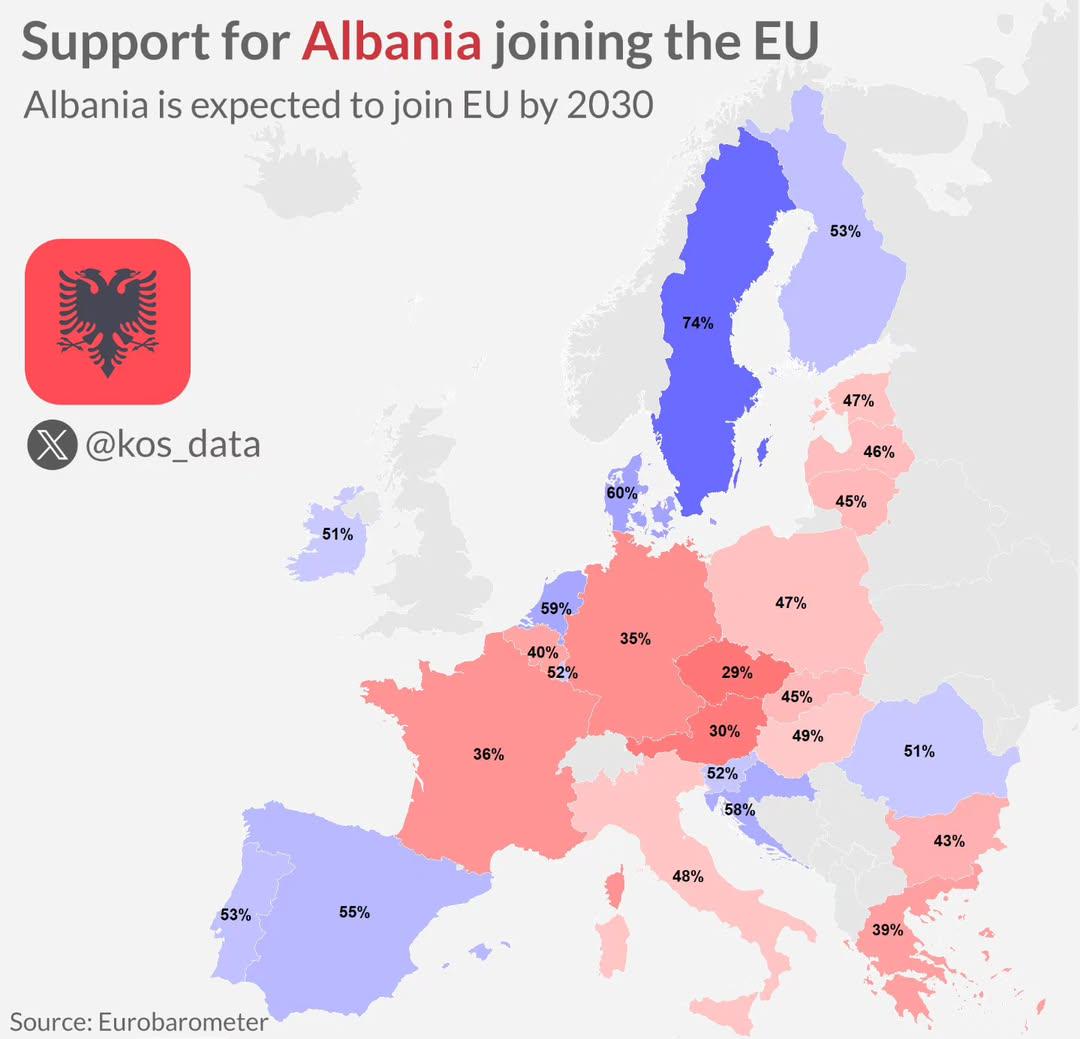Support for Albania Joining the EU Map


David Chen
Data Visualization Specialist
David Chen is an expert in transforming complex geographic datasets into compelling visual narratives. He combines his background in computer science ...
Geographic Analysis
What This Map Shows
This map visualizes the levels of support among European Union member states for Albania's accession to the EU. It highlights the varying degrees of endorsement or opposition from each member state, providing a clear picture of the political climate surrounding Albania's EU aspirations. Understanding these dynamics is crucial as Albania seeks to solidify its place in a union that promotes economic cooperation and political stability.
Deep Dive into Albania's EU Aspirations
Albania, located in Southeast Europe on the Balkan Peninsula, has been a candidate for EU membership since 2014. The journey toward EU integration involves meeting stringent criteria set by the EU, which includes reforms in governance, the judiciary, and the economy. Interestingly, the support for Albania's EU membership is not uniform across the continent; it varies significantly among member states, influencing the pace and success of its accession process.
One of the primary concerns regarding Albania's EU membership revolves around issues of corruption and the rule of law. The European Commission has frequently cited the need for more robust judicial reforms and anti-corruption measures as prerequisites for Albania's accession. For instance, in its 2020 report, the Commission praised Albania's progress but noted that significant challenges remained, particularly in terms of judicial independence and combating organized crime.
Additionally, the geopolitical landscape plays a substantial role in shaping member states' support. Countries like Italy and Greece, which share historical and cultural ties with Albania, generally exhibit favorable attitudes toward its EU ambitions. Conversely, nations such as France and the Netherlands have expressed skepticism, citing concerns over migration and the EU's ability to absorb new members without compromising existing stability.
In terms of public opinion, surveys indicate that a majority of Albanians support EU membership, viewing it as a pathway to economic development and enhanced living standards. This national consensus may indirectly influence member states' positions, as they consider public sentiment and potential diplomatic relations when evaluating the request for membership.
Regional Analysis
The map reveals distinct regional patterns in support for Albania's EU accession. Southern European countries, particularly those with historical connections to the Balkans, show a higher level of support. For instance, Italy, a significant ally, has voiced strong backing for Albania’s EU ambitions, highlighting shared interests in security and economic cooperation. Meanwhile, Greece, while supportive, has also raised concerns regarding minority rights and border issues, reflecting a complex relationship.
In contrast, Northern European countries, such as Sweden and Denmark, tend to exhibit more reserved attitudes toward Albania's accession. These nations often emphasize the need for rigorous standards of governance and human rights, which they feel Albania must meet before receiving membership. Furthermore, the varying economic conditions across EU member states contribute to these differences in support. Wealthier nations may be more cautious in extending membership to countries perceived as economically less stable, fearing increased financial burdens on the EU budget.
A notable outlier in this discussion is Germany, which has historically played a pivotal role in EU enlargement discussions. While Germany has shown a supportive stance, its position often hinges on the broader EU consensus, which can be influenced by other member states' reservations.
Significance and Impact
The question of Albania's EU membership is significant not only for Albania but for the EU as a whole. Should Albania successfully join the EU, it could herald a new era of stability and cooperation in the Balkans, a region that has historically faced challenges related to conflict and economic disparity. The integration of Albania could also set a precedent for other Western Balkan countries aspiring to join the EU, potentially leading to a more unified and secure Europe.
However, the path to membership is fraught with challenges. Current trends indicate a growing skepticism among EU citizens regarding enlargement, particularly as economic pressures mount. Have you noticed that as economic concerns rise, so does political resistance to enlargement? This could result in prolonged negotiations and a more intricate accession process for Albania.
In conclusion, the support for Albania's EU membership, as illustrated by the map, reflects a complex interplay of historical ties, economic considerations, and political dynamics. As Albania continues to reform and aspire for EU membership, the response from existing member states will be pivotal in shaping its future and the overall stability of the Balkan region.
Visualization Details
- Published
- September 21, 2025
- Views
- 60
Comments
Loading comments...